George Meredith
George Meredith OM (12 February 1828 – 18 May 1909) was an English novelist and poet of the Victorian era. He was nominated for the Nobel Prize in Literature seven times.[1]
George Meredith | |
|---|---|
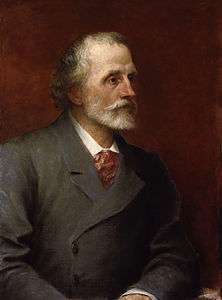 George Meredith in 1893 by George Frederic Watts | |
| Born | 12 February 1828 Portsmouth, Hampshire, England |
| Died | 18 May 1909 (aged 81) Box Hill, Surrey, England |
| Nationality | English |
| Literary movement | Victorian literature |
| Notable works | Modern Love |
| Spouses | Mary Ellen Peacock (1849–1861) Marie Vulliamy (1864–1886) |
| Children | 3 |
| Signature | |
Life
Meredith was born in Portsmouth, Hampshire, a son and grandson of naval outfitters.[2] His mother died when he was five. At the age of 14 he was sent to a Moravian School in Neuwied, Germany, where he remained for two years. He read law and was articled as a solicitor, but abandoned that profession for journalism and poetry. He collaborated with Edward Gryffydh Peacock, son of Thomas Love Peacock, in publishing a privately circulated literary magazine, the Monthly Observer.[3] He married Edward Peacock's widowed sister Mary Ellen Nicolls in 1849 when he was twenty-one years old and she was twenty-eight.[2]
Meredith collected his early writings, first published in periodicals, in an 1851 volume, Poems. In 1856 he posed as the model for The Death of Chatterton, a notable painting by the English Pre-Raphaelite painter Henry Wallis (1830–1916).[4] His wife ran off with Wallis in 1858; she died three years later. The collection of sonnets entitled Modern Love (1862) emerged from this experience as did The Ordeal of Richard Feverel, his first major novel.[2]
Meredith married Marie Vulliamy in 1864 and settled in Surrey, first in Norbiton and then, at the end of 1867, near Box Hill. He continued writing novels and poetry, often inspired by nature. He had a keen understanding of comedy and his Essay on Comedy (1877) remains a reference work in the history of comic theory. In The Egoist, published in 1879, he applies some of his theories of comedy in one of his most enduring novels. Some of his writings, including The Egoist, also highlight the subjugation of women during the Victorian period. During most of his career, he had difficulty achieving popular success. His first successful novel was Diana of the Crossways published in 1885.[5]
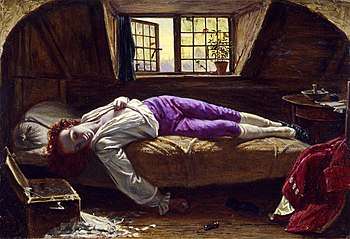
Meredith supplemented his often uncertain writer's income with a job as a publisher's reader. His advice to Chapman and Hall made him influential in the world of letters. His friends in the literary world included, at different times, William and Dante Gabriel Rossetti, Algernon Charles Swinburne, Cotter Morison,[6] Leslie Stephen, Robert Louis Stevenson, George Gissing and J. M. Barrie. Gissing wrote in a letter to his brother Algernon that Meredith's novels were 'of the superlatively tough species'.[7] His contemporary Sir Arthur Conan Doyle paid him homage in the short-story "The Boscombe Valley Mystery", when Sherlock Holmes says to Dr. Watson during the discussion of the case, "And now let us talk about George Meredith, if you please, and we shall leave all minor matters until to-morrow." Oscar Wilde, in his dialogue "The Decay of Lying", implies that Meredith, along with Balzac, is his favourite novelist, saying "Ah, Meredith! Who can define him? His style is chaos illumined by flashes of lightning".
In 1868 Meredith was introduced to Thomas Hardy by Frederic Chapman of Chapman & Hall the publishers. Hardy had submitted his first novel, The Poor Man and the Lady. Meredith advised Hardy not to publish his book as it would be attacked by reviewers and destroy his hopes of becoming a novelist. Meredith felt the book was too bitter a satire on the rich and counselled Hardy to put it aside and write another 'with a purely artistic purpose' and more of a plot. Meredith spoke from experience; his first big novel, The Ordeal of Richard Feverel, was judged so shocking that Mudie's circulating library had cancelled an order of 300 copies. Hardy continued in his attempts to publish the novel: however it remained unpublished, though he clearly took Meredith's advice seriously.[8]
Meredith's politics were those of a Radical Liberal and he was friends with other Radicals such as Frederick Maxse and John Morley.[9][10] Before his death, Meredith was honoured from many quarters: he succeeded Lord Tennyson as president of the Society of Authors; in 1905 he was appointed to the Order of Merit by King Edward VII.[2]
In 1909, he died at his home in Box Hill, Surrey.[2] He is buried in the cemetery at Dorking, Surrey.[11]
Personal life
Meredith had two wives and three children. He outlived both wives and one child.
On 9 August 1849, Meredith married Mary Ellen Nicolls (née Peacock), a beautiful widow with a daughter. They had one child, Arthur (1853–1890). In 1858 she ran off with the painter Henry Wallis, shortly before giving birth to a child assumed to be Wallis's. Mary Ellen died in 1861.[12][13]
On 20 September 1864, Meredith married Marie Vulliamy. She died of cancer in 1886.[13]
Meredith had three children:
with Mary Ellen
- Arthur Gryffydh (1853–1890)
with Marie
- William Maxse (1865–1937)[13]
- Marie Eveleen (known as Mariette) (1871–1933). She married Henry Parkman Sturgis.
Works
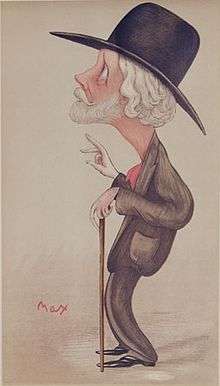
Meredith as caricatured by Max Beerbohm in Vanity Fair, September 1896
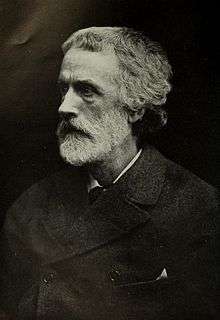
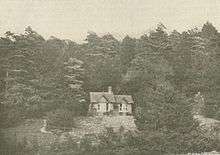
Essays
- Essay on Comedy (1877)
Novels
- The Shaving of Shagpat (1856)
- Farina (1857)
- The Ordeal of Richard Feverel (1859)
- Evan Harrington (1861)
- Emilia in England (1864), republished as Sandra Belloni in 1887
- Rhoda Fleming (1865)
- Vittoria (1867)
- The Adventures of Harry Richmond (1871)
- Beauchamp's Career (1875)
- The House on the Beach (1877)
- The Case of General Ople and Lady Camper (1877)
- The Tale of Chloe (1879)
- The Egoist (1879)
- The Tragic Comedians (1880)
- Diana of the Crossways (1885)
- One of our Conquerors (1891)
- Lord Ormont and his Aminta (1894)
- The Amazing Marriage (1895)
- Celt and Saxon (1910)
Poetry
- Poems (1851)
- Modern Love (1862)
- The Lark Ascending (1881),[14] (which inspired Vaughan Williams' instrumental work of that title).[15]
- Poems and Lyrics of the Joy of Earth (1883)
- The Woods of Westermain (1883)
- A Faith on Trial (1885)
- Ballads and Poems of Tragic Life (1887)
- A Reading of Earth (1888)
- The Empty Purse (1892)
- Odes in Contribution to the Song of French History(1898)
- A Reading of Life (1901)
- Selected Poems of George Meredith (1903, author's supervision)[16]
- Last Poems (1909)
- Lucifer in Starlight
- Dirge in woods
References
- "Nomination Database". www.nobelprize.org. Retrieved 19 April 2017.
- Meredith, George (1963). The Egoist. The New American Library of World Literature (Signet Classics). Introduction (first page).
- Foundation, Poetry (3 August 2019). "George Meredith". Poetry Foundation. Retrieved 3 August 2019.
- The Solicitors' Journal and Reporter. Law Newspaper Company. 3 August 1860. p. 331. Retrieved 3 August 2019 – via Internet Archive.
- Lee, Sidney, ed. (1912). . Dictionary of National Biography (2nd supplement). 2. London: Smith, Elder & Co. pp. 604–616.
- Meredith's place in the circles of Rosetti, Swinburne, Morison, Sir Alexander Duff-Gordon and Sir William Hardman is described in S. M. Ellis, A Mid-Victorian Pepys, The Letters and Memoirs of Sir William Hardman, M.A., F.R.G.S (Cecil Palmer, London 1923), which includes an early photograph of George Meredith with his son Arthur Meredith, facing p. 50.
- Letters of George Gissing to members of his family, collected and arranged by Algernon and Ellen Gissing. London: Constable, 1927, letter dated 12 June 1884.
- Tomalin, Claire. Thomas Hardy: The Time Torn Man. New York: Penguin, 2007.
- McGlamery, Gayla S. (1993). "George Meredith and modern Liberal theory". Nineteenth-Century Contexts. 17 (1): 1–16.
- Taylor, Antony (2010). "'The Old Chartist': Radical Veterans on the Late Nineteenth- and Early Twentieth-Century Political Platform". History. 95 (4): 458–476.
- Dorking Museum
- Vendler, Hellen (29 April 2013). "The Tragedy in the Bedroom". The New Republic.
- "George Meredith (1828–1909) – A Brief Biography". www.victorianweb.org. Retrieved 3 August 2019.
- First printed in The Fortnightly, May 1881.
- allpoetry.com. "The Lark Ascending by George Meredith". Retrieved 16 July 2011.
- Archibald Constable and Co., Westminster 1903.
Further reading
- Clodd, Edward. "George Meredith (1828–1909)", in Clodd's Memories (London: Chapman and Hall, 1916), on p. 138–164.
- Dawson, William James. "George Meredith", in Dawson's The Makers of English Fiction, 2nd ed., (New York: F.H. Revell Co., 1905), on p. 191–212.
- Ellis, Stewart Marsh. George Meredith: His Life and Friends in Relation to his Work (Grant Richards Ltd, London 1920). read here
- Ellis, Stewart Marsh. A Mid-Victorian Pepys. The Letters and Memoirs of Sir William Hardman, M.A., F.R.G.S. (Cecil Palmer, London 1923).
- Sassoon, Siegfried. Meredith (Constable, London 1948).
- Harris, Margaret. "Meredith, George (1828–1909)". Oxford Dictionary of National Biography (online ed.). Oxford University Press. doi:10.1093/ref:odnb/34991. (Subscription or UK public library membership required.)
External links
| Wikiquote has quotations related to: George Meredith |
| Wikisource has original works written by or about: George Meredith |
| Wikimedia Commons has media related to George Meredith. |
- Portal for articles on George Meredith
- Biography of George Meredith by Elvira Casal
- W.E. Henley on George Meredith
- "George Meredith: A Study", by Leonie Gilman, National Magazine, December 1905
- Meredith index entry at Poets' Corner
- Poems by George Meredith
- Modern Love
- The Works of George Meredith at The University of Adelaide Library
- Works by George Meredith at Project Gutenberg
- Works by or about George Meredith at Internet Archive
- Works by George Meredith at LibriVox (public domain audiobooks)

- Archival material at Leeds University Library
- George Meredith Collection. General Collection, Beinecke Rare Book and Manuscript Library, Yale University.